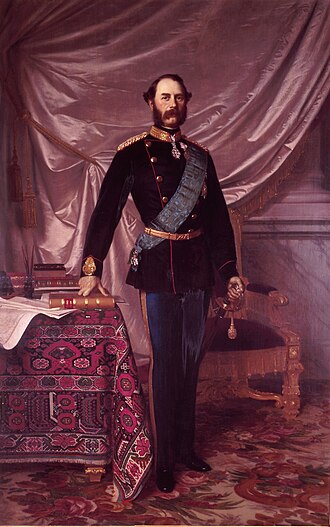A crisis best not forgotten
 Today is the anniversary of King Christian IX of Denmark signing a constitution on November 18, 1863 that got him into The Second Schleswig War with the German Confederation. Which maybe seems like a nasty thing for Germany to do. Or, once I add that this Constitution effectively annexed Schleswig, which the King of Prussia regarded as a violation of the London Protocol, this “Schleswig-Holstein crisis” starts to sound like a Monty Python sketch about European dynastic politics. Except looking back it’s an ominous precursor to both World Wars.
Today is the anniversary of King Christian IX of Denmark signing a constitution on November 18, 1863 that got him into The Second Schleswig War with the German Confederation. Which maybe seems like a nasty thing for Germany to do. Or, once I add that this Constitution effectively annexed Schleswig, which the King of Prussia regarded as a violation of the London Protocol, this “Schleswig-Holstein crisis” starts to sound like a Monty Python sketch about European dynastic politics. Except looking back it’s an ominous precursor to both World Wars.
It is extremely convoluted. There’s a famous remark (well, famous among people who like such things) attributed to British statesman Lord Palmerston that “Only three people have ever really understood the Schleswig-Holstein business—the Prince Consort, who is dead—a German professor, who has gone mad—and I, who have forgotten all about it.” So I’m not going to try to give you all the details lest I go mad or perish. And I’m not really in a position to forget them due to never having known them. But here’s an ominous summary.
Both the First Schleswig War (1848–51) and the Second (1864) were fought over two duchies, Holstein and Lauenburg, driven by secessionist movements by ethnic Germans. And it is worth emphasizing that Denmark had since the 1848 wave of liberal revolutions in Europe been a constitutional monarchy, while Prussia was nothing of the sort and neither was its Austrian ally.
Now you may think it a no-brainer that Prussia and Austria walloped Denmark without undue difficulty and forced it to cede Schleswig, Holstein, and Saxe-Lauenburg. (Yes, another duchy heard from.) And the new King of Denmark did know he was in a tight spot when forced to choose between signing the November Constitution or defying the will of his people. But looking back we are more aware of the looming menace of a unifying German Empire than people might have been in 1864.
Including the Austrians who, um, got into a war with Prussia two years later that lasted only seven weeks and ended in an upset victory for Prussia which thus came to dominate Germany and, after another unexpected victory over France in 1870, to unify most of it under what would not unreasonably be called “Prussian militarism”.
Most. But not all. The ethnic map of Europe is complex even by the normal standards of humanity in which the Wilsonian dream of universal peace due to rigorous avoiding of multiculturalism is impractical. And as Germany continued to swell geographically and in ambition, it used the need to assemble all Germans under a single flag and the alleged mistreatment of German minorities as a pretext to war on one state after another in an fairly unbroken stream from 1864 through 1945. (Also, Prussia/Germany could not build the Kiel Canal to get its battleships back and forth between the Baltic to defeat Russia and the North Atlantic to defeat Britain until it controlled Holstein.)
It looked like Pythonesque rubbish back in 1864. But it would have been better for major powers to stand up to German nastiness back then when it would have been easier to stop.